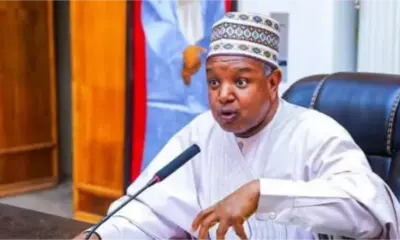Economy
Ganduje calls for investment in Nigerian livestock industry

…advocates for effective measures to address farmer-herder conflicts
As part of efforts to diversify the country’s economy and increase its Gross Domestic Product (GDP), the National Chairman of the ruling All Progressives Congress (APC), Dr. Abdullahi Umar Ganduje is advocating for deliberate efforts to invest in the country’s livestock industry.

Ganduje made the call at the 12th Joint Annual Meeting of National Institute of Animal Science (NIAS) and Animal Science Association of Nigeria (ASAN) on Tuesday in Abuja.
In his keynote address, the APC leader stated that the Nigerian livestock industry could be valued at N50 trillion over the next decade with more than 30% increase in the country’s current Gross Domestic Product (GDP), if there is proper investment in the sector.
Speaking on the topic, ‘Towards a sustainable livestock production system for national economic development’, Ganduje said, “Livestock farming is one of the most profitable businesses in the agricultural industry. It is the management and breeding of livestock for the purpose of obtaining their meat and milk for consumption, as well as other products (wool, fur, etc.) for industrial and labor purposes (animal traction). As long as meat, leather products, milk, etc. are in demand, livestock production will always remain a profitable business.
“With the proper infrastructure and support for value chain development, expansion and sustenance, financing, research and development for new breeds, as well as, capacity development of operators in place, the Nigerian livestock industry could be valued at N50 trillion over the next decade. The current worth of the industry would therefore constitute approximately 20 percent of Nigeria’s Gross Domestic Product and more than 30 percent, at the rate of the 10-year projected figure, against today’s GDP”.
The APC National Chairman also stressed the need for strategies to mediate and mitigate the issue of farmer-herder crisis in Nigeria.
Dr Ganduje noted that herders-farmers conflicts which was initially predominantly in North-Central Nigeria have spread across almost all parts of the country. He further warned that if nothing is done, there is a possibility that it would continue to spread till it gets to other West African countries.
He urged governments at all levels to devise ways to address the root cause of this challenge, stressing that preventing conflicts is far cheaper than managing it.
“Thousands of people have died since these attacks began. Sedentary farming in rural communities is often the target of attacks because of their vulnerability. There are fears that this conflict will spread to other West African countries, but this has often been downplayed by governments in the region.
“Attacks on herders have also led them to retaliate, by attacking other communities.
The remote causes are hidden causes, which may not be apparent in farmer-cattle herder relationship, but yet, a potent force that fuels the conflict. These include ethnic and religious inclinations, poverty, effects of climate change and rapid population growth.
“Taking into consideration the negative effects of conflict on food security, environmental and livestock production sustainability and the overall stability of the economy, there is an urgent need to mediate and/or mitigate herders-farmers conflict. However,the motivation to seek strategies to prevent/manage conflict lies in the fact that the costs of conflicts are much more than the costs of preventing them. The efforts in preventing/managing conflict lie on thorough understanding of the causes of the conflict.
“Strategies to mitigate farmer-cattle herder conflict include but not limited to, creation of awareness of climate change, tree planting campaign, use of improved technology, creation of awareness, symbiotic farming projects, establishment of peace-building committees, establishment of open communication channels, inter-religious dialogue, payment of compensation, establishment of grazing land policy, adoption of ranching policy, early warning mechanism, animal identification and traceability system’, Ganduje noted.
The APC National leader also assured Nigerians that the President Tinubu -led administration through its Renewed Hope Agenda will ensure it provides affordable and nutritious food on a sustainable basis for citizens.
“The Federal Government of Nigeria under President Bola Ahmed Tinubu’s leadership is genuinely concerned about our food insecurity situation and is doing everything possible to ensure that all Nigerians have access to affordable and nutritious food on a sustainable basis.
“Therefore, I enjoin you all to join hands with our dear President Ahmed Bola Tinubu, as he labours hard to reposition our agriculture sector for sustainable food security, within the framework of the Renewed Hope Agenda”, he added.
Also speaking, the Minister of State for Agriculture and Food Security, Aliyu Sabi Abdullahi emphasized that climate change is posing a serious threat to the country’s agricultural sector.
He stressed that the country must not only mitigate climate change but also raise its level of preparedness by putting policies and strategies in place that support climate and smart Agriculture.
One of the highlights of the NIAS/ASAN meeting was the induction of Dr. Ganduje as associate fellow of the Nigeria Institute of Animal Science (NIAS).

























